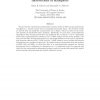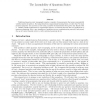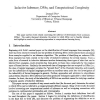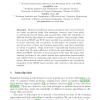107
click to vote
ECCC
2006
15 years 2 months ago
2006
We give the first representation-independent hardness results for PAC learning intersections of halfspaces, a central concept class in computational learning theory. Our hardness ...
121
click to vote
ECCC
2006
15 years 2 months ago
2006
Traditional quantum state tomography requires a number of measurements that grows exponentially with the number of qubits n. But using ideas from computational learning theory, we...
110
click to vote
DAGSTUHL
1996
15 years 3 months ago
1996
The areas of On-Line Algorithms and Machine Learning are both concerned with problems of making decisions about the present based only on knowledge of the past. Although these area...
109
click to vote
ECML
2006
Springer
15 years 5 months ago
2006
Springer
This paper studies the PAC and agnostic PAC learnability of some standard function classes in the learning in higher-order logic setting introduced by Lloyd et al. In particular, i...
112
click to vote
AII
1989
15 years 6 months ago
1989
This paper surveys recent results concerning the inference of deterministic finite automata (DFAs). The results discussed determine the extent to which DFAs can be feasibly inferr...
168
click to vote
COLT
1994
Springer
15 years 6 months ago
1994
Springer
Inductive Logic Programming (ILP) involves the construction of first-order definite clause theories from examples and background knowledge. Unlike both traditional Machine Learnin...
152
click to vote
COLT
2001
Springer
15 years 6 months ago
2001
Springer
We prove strong noise-tolerance properties of a potential-based boosting algorithm, similar to MadaBoost (Domingo and Watanabe, 2000) and SmoothBoost (Servedio, 2003). Our analysi...
123
click to vote
COLT
2003
Springer
15 years 7 months ago
2003
Springer
Abstract. In this paper we initiate an exploration of relationships between “preference elicitation”, a learning-style problem that arises in combinatorial auctions, and the pr...
110
click to vote
FOCS
2006
IEEE
15 years 8 months ago
2006
IEEE
We give the first representation-independent hardness results for PAC learning intersections of halfspaces, a central concept class in computational learning theory. Our hardness...
113
click to vote
ECCV
2002
Springer
16 years 3 months ago
2002
Springer
Numerous statistical learning methods have been developed for visual recognition tasks. Few attempts, however, have been made to address theoretical issues, and in particular, stud...




